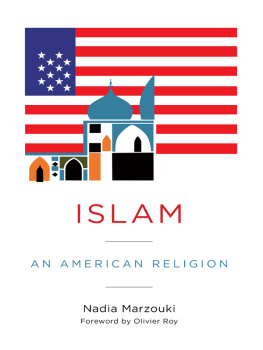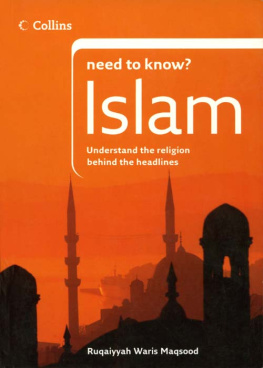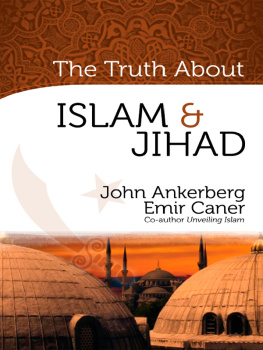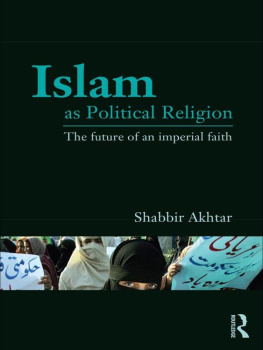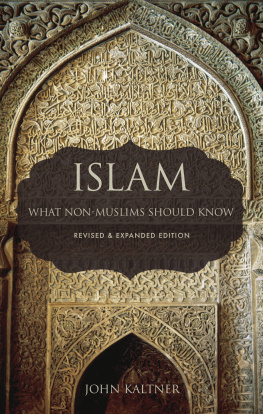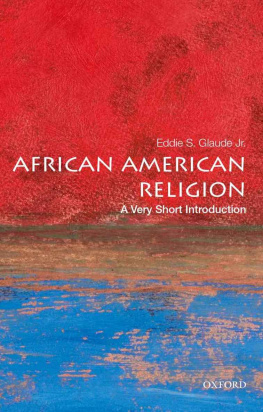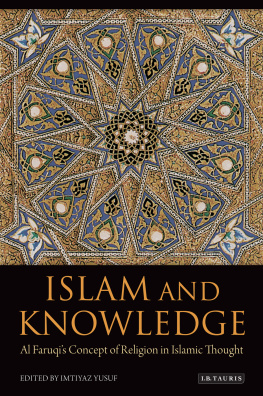Table of Contents
ISLAM
ISLAM
AN AMERICAN RELIGION
NADIA MARZOUKI
Translated by C. Jon Delogu
Columbia University Press
New York
Columbia University Press
Publishers Since 1893
New York Chichester, West Sussex
cup.columbia.edu
Copyright 2013 Editions du Seuil
Translation Copyright 2017 Columbia University Press
All rights reserved
E-ISBN 978-0-231-54392-7
Library of Congress Cataloging-in-Publication Data
Names: Marzouki, Nadia, author. | Delogu, Christopher Jon, translator.
Title: Islam, an American religion / Nadia Marzouki; translated by C. Jon Delogu.
Other titles: Islam, une religion Amricaine? English
Description: New York: Columbia University Press, [2017] | Includes bibliographical references and index.
Identifiers: LCCN 2016044401 (print) | LCCN 2016047257 (ebook) | ISBN 9780231176804 (cloth: alk. paper) | ISBN 9780231543927 (e-book)
Subjects: LCSH: IslamSocial aspectsUnited States. | Islam and politicsUnited States. | IslamophobiaUnited States.
Classification: LCC BP67.U6 M3713 2017 (print) | LCC BP67.U6 (ebook) | DDC 305.6/97dc23
LC record available at https://lccn.loc.gov/2016044401
A Columbia University Press E-book.
CUP would be pleased to hear about your reading experience with this e-book at .
COVER DESIGN: Jordan Wannemacher
COVER IMAGE: Illustration by Eric Deleporte
IN MEMORY OF AZIZA BEN KRAEM AND BARBARA SNITKOVA
CONTENTS
N adia Marzoukis book is much more than just a monograph about Islam in the United States. Through careful consideration of the relations between the West and its Islam, her study reflects on the vision that the West keeps of itself, especially when doubting its values and its own political culture. The debate about Islam is the symptom of a profound crisis, even if, of course, this debate takes up Islam either to reject it or integrate it. And these two campsthose who think that Islam is incompatible with the West (though which West?) and those who think that it can be integrated within itare in agreement when it comes to defining Islam as the locus of the other, of difference, and of foreignness. Living with ones differences, multiculturalism, reasonable accommodation, toleranceall these terms deployed to conceptualize integration also cement in place the idea of an unsurpassable alterity.
The advantage of Nadia Marzoukis detour through the United States is to isolate the quasi-existential presence of Islam from the various parameters that cloud the debate more than they clarify it. If in both Europe and the United States the presence of a large Muslim population is recent, the place of that population is different. In Europe, Muslims are linked to three sensitive issues: immigration, social exclusion, and the return of the sacred. In the United States, the debates on immigration and the socially excluded are hardly focused on the Muslim population but instead on Latinos (when it comes to immigration) and on African Americans (when it comes to social exclusion). Moreover, American Muslims, especially the foreign born, generally belong to the middle and upper classes, unlike their European coreligionists. Finally, America is familiar with the resurgence of religious practitioners, especially Christians, as illustrated by evangelicals and the Tea Party. In America, public demonstrations of religiosity are not on the face of it considered bizarre or expressions of fanaticism, as is often the case in Europe, including when it comes to Christianity. But the paradox is that, even after setting aside these three factors (immigration, social exclusion, religious visibility) that are associated with Islam in Europe, one nevertheless finds across a large portion of the American population the same rejection of Islam as a religion, a rejection that has boosted European populism of late.
In short, there is indeed an invariable rejection of Islam in the West that is independent of questions of immigration, social exclusion, and challenges to secularism and French lacit. Islam is perceived as the absolute other whose very presence requires a rethinking of what constitutes the political bond, beyond the social contract and republican integrationthat is, beyond the two founding elements that allowed one to conceive of the civis as composed of varying individuals and populations. Yet the vast amount of whats been written in the social sciences about the integration of Muslims in Western countries generally focuses on three questions: the theological question (Is Islam compatible with Western values?), the sociological question (How does one integrate a population that derives mostly from immigrant workers?), and the legal question (What standing should the religious practices of Muslims have, including the matters of veils, minarets, halal meat, etc.?). In other words, it considers the conditions of compatibility between Islam and Western societies by establishing entirely reasonable objectives. One can notice how, little by little, Muslims, with the exception of Salafists, define their faith in compatible terms (with values of self-realization instead of Sharia), enter the middle classes, and integrate within the institutional framework provided for religion (Mosque parishes, chaplaincies, etc.). But this scientific literature mostly leaves out the subjective question of acceptabilitythat is, the emotional reaction to the presence of Islam. Generally, these reactions, if recognized at all, are lumped into an unworthy category of subjectivity, as primitive reactions that ought to be surpassed by rational thought, or worse yet rejected out of hand under the heading racism. And even if the number of studies of racism is increasing in the social sciences, inquiry into Islamophobia is either denied (There is no Islamophobia, only racism or This is just an exercise in free speech) or disqualified (because its racist, and therefore devoid of all pertinence). However, one hardly ever asks about what the rejection of the other means for self-affirmation. If Islam is perceived as unassimilablein other words, as incompatible with the constitution of the political bondthen what does constitute the political bond?
In simple terms, Western political culture has two models of political bond: citizenship, which entails that the social bond is above all political and derives from the nation-state, and the social contract, which considers the state as a simple arbitrator over a contract decided on by free, equal, and rational individuals. The first paradigm is the ground of republican integration, so dear to the French, but is also active in countries of positive law (where law is the expression of the will of the sovereign); the second is the foundation of reasonable accommodation, the expression of a liberal conception of political life as practiced in countries of common law (where laws are above all contractual). But as we shall see, these two paradigms have hardly been successful at dissipating a malaise, as one notices both the failure of the liberal call for reasonable accommodation and the crisis of ineffectual calls to citizenship and political integration.
If we take three entirely distinct examples of what is supposed to regulate the religious within the public sphereFrances 1905 law affirming republicanism centered on the state, the Italian constitution as an expression of concordance with a privileged church, and Canadas principle of reasonable accommodationone observes that all three have more trouble managing secularism than the religious. We can consider as examples a recent crisis in each country: the




